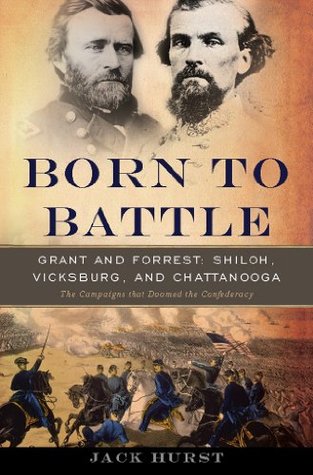
Born to Battle
Grant and Forrest—Shiloh, Vicksburg, and Chattanooga
کتاب های مرتبط
- اطلاعات
- نقد و بررسی
- دیدگاه کاربران
نقد و بررسی

March 12, 2012
Hurst (Nathan Bedford Forrest: A Biography) juxtaposes Ulysses S. Grant and Nathan Bedford Forrest during the period when each began demonstrating the abilities that made them respected opponents. They first faced each other at Shiloh in April 1862. By the summer of 1863, Forrest had developed a reputation as the western Confederacy’s “wizard of the saddle,” master of the lightning strike and the long-distance raid. Grant was established as an artist of maneuver. His feints and slashes had confounded his opponents and culminated in the capture of Vicksburg. At Chattanooga he showed he could fight and win a head-to-head battle as well. Making sophisticated use of archival and printed sources, Hurst maintains that the marginalization of Forrest, a blacksmith’s son, by a Confederacy insisting on “blue-blood leadership” was “a chief cause of the Confederacy’s death.” The Union, by contrast, made effective use of the equally lowborn and unpolished Grant. Both, Hurst asserts, exemplified the common men who did most of the war’s dying. Both understood what soldiers could do in particular situations. And both were accustomed by peacetime hardship to the fears and anxieties of wartime command. The comparison, if not entirely convincing, is original and provocative. Photos. Agent: Deborah Grosvenor, Grosvenor Literary Agency.

April 15, 2012
A lively narrative of the Civil War's Western theatre, too often overshadowed by the better known armies and battles in the East. Historian Hurst (Men of Fire: Grant, Forrest, and the Campaign That Decided the Civil War, 2007, etc.) continues the work he began in Men of Fire, following the careers of Ulysses S. Grant and Nathan Bedford Forrest from Shiloh to the defense of Chattanooga. These biographies appear together in support of his thesis that both generals were of working-class origin but "Northern inclusiveness permitted the rise of Grant...while Southern insularity predestined the Confederacy to squander the brilliance of Forrest, whose fertile brain and vicious valor might have helped fashion an opposite outcome." This appears to be a stretch, however; it is not clear that given greater command, Forrest could have done more to turn the Union tide. Further, Grant was a West Point graduate, while Forrest was a nearly unlettered former slave trader who spoke "primitive English." These differences would have been significant in any officer class, but Forrest nevertheless achieved the rank of major general. He appears here as a brilliant, determined, crude and insubordinate warrior, chafing under snubs from the aristocratic Gen. Braxton Bragg, who considered him "nothing more than a good raider" despite his spectacular exploits against superior forces. Grant, the stolid but surprisingly resourceful commander, suffered under similar prejudices on the part of his superior, Gen. Henry Halleck, but ultimately brought Halleck around through battlefield success and their shared opposition to the scheming politician Gen. John McClernand. Hurst amply illuminates the misery visited upon Tennessee and Mississippi as the armies moved back and forth across the land, along with the backbiting, blunders and inflated egos that abounded in both armies. Particularly recommended for fans of the controversial Forrest.
COPYRIGHT(2012) Kirkus Reviews, ALL RIGHTS RESERVED.

May 15, 2012
The western campaigns in the Civil War were certainly important but perhaps not as important as indicated in this interesting but uneven work. The title itself is deceptive because, aside from Shiloh, the forces under the immediate, direct command of Grant and Nathan Bedford Forrest did not confront each other. Still, Hurst knows both his men and their military achievements. Forrest, in particular, is viewed as a compelling but rather terrifying figure. He was born poor, had little formal education, and had a lifelong resentment of his social betters, who viewed him with disdain. Yet he made a fortune as a slave trader, and he was a ferocious, merciless warrior with an uncanny knack for moving his cavalry quickly across his opponents' line of march. Grant, too, had trouble with his military superiors early in the war, but Hurst goes overboard in finding parallels in their lives and personalities, and he inflates the importance of some of Forrest's triumphs. This is a useful but flawed work that is best suited for well-informed general readers.(Reprinted with permission of Booklist, copyright 2012, American Library Association.)

























دیدگاه کاربران